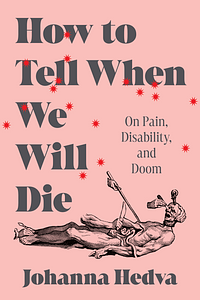You need to sign in or sign up before continuing.
Take a photo of a barcode or cover
slow-paced
Kindness is a form of magic we can choose to know how to do.
I both felt seen and was frustrated by reading this collection of essays. I read “Sick Woman Theory” years ago, in my early twenties, when I was not disabled, but becoming interested in the concepts of normativity and ability. I started this collection the day after I saw a specialist who brought me a big step closer to diagnosing chronic symptoms, and in the midst of terrible lightheadedness, pain, fatigue. The start of this book was what I needed to hear, a mirror of the anger and grief and frustration I’ve been actively feeling about ableism. I felt vindicated, excited, thankful by four (plus one a little later) starting essays, in part because they work well with each other and with the book’s theme:
I both felt seen and was frustrated by reading this collection of essays. I read “Sick Woman Theory” years ago, in my early twenties, when I was not disabled, but becoming interested in the concepts of normativity and ability. I started this collection the day after I saw a specialist who brought me a big step closer to diagnosing chronic symptoms, and in the midst of terrible lightheadedness, pain, fatigue. The start of this book was what I needed to hear, a mirror of the anger and grief and frustration I’ve been actively feeling about ableism. I felt vindicated, excited, thankful by four (plus one a little later) starting essays, in part because they work well with each other and with the book’s theme:
How to Tell When We Will Die:
We count among our strengths, our strength; and among our weaknesses, our weakness. The only radicality we can yield to this binary is to invert it: to count what is usually considered weak as, maybe, some other kind of strength.
We count among our strengths, our strength; and among our weaknesses, our weakness. The only radicality we can yield to this binary is to invert it: to count what is usually considered weak as, maybe, some other kind of strength.
Sick Woman Theory:
To be pathologized is to be allowed to survive.
To be pathologized is to be allowed to survive.
The Blast Radius of Disability:
One of the reasons disability is so devastating to capitalism is because the main thing it devastates is chronological, quantitative time.
One of the reasons disability is so devastating to capitalism is because the main thing it devastates is chronological, quantitative time.
In Defense of De-Persons
Letters to a Young Doctor
Letters to a Young Doctor
The writing after this great start was scattershot—broad, varied, public and private—and more personal, which I don’t especially enjoy. A couple of essays were uncomfortably close to personal traumas, and I skipped them when I noticed. Others were repetitive, ordered counterintuitively, topics I didn’t feel attached to, or had conclusions I disagreed with. I bristled often, at tone, at self-perceptions, at ways of framing others, at what was focused on and what wasn’t. At times, I felt defensive.
I loved Andrea Longchu’s Thesis in Females: that everyone is female and everyone hates it. I’m inspired to use the word “woman” because to be a woman can still be radical in the 21st century.
One curious aspect of their thinking is the trans AFAB perspective of being something like female. I’m non-binary too, and have very little attachment to womanhood, and I align my identity with queerness, though I have also been oppressed by the patriarchy and an assumption of femaleness. So that was weird, and made the central concept of this writing (sick woman, psycho, hag) fail to land. I also don’t really understand LA, writer/artist role models or horror movies.
A core fact about care and kink is that it requires strong boundaries to work well. Although everyone understands that about kink, this fact is not included in how we understand care.
A core fact about care and kink is that it requires strong boundaries to work well. Although everyone understands that about kink, this fact is not included in how we understand care.
I anticipated a book on disability and pain, by and for disabled people. There is a lovely mix of writing about mental, physical, and cognitive disabilities; health/care; drug addiction; kink; family, and growing up. However, the intended audience wasn’t quote clear, and Hedva only partially delivered on the proposed topics.
Graphic: Ableism, Mental illness
Moderate: Addiction, Child abuse, Misogyny, Violence, Forced institutionalization, Suicide attempt
Minor: Confinement, Racism, Toxic relationship, Police brutality
i really wanted to like this but i guess i was expecting more of like a rigorous look in disability and ableism and this wasnt that.
challenging
dark
emotional
slow-paced
challenging
emotional
funny
hopeful
reflective
medium-paced
emotional
informative
reflective
slow-paced
This isn't my usual type of writing - it is artistic, not straightforward, but it was absolutely beautiful.
slow-paced
certain essays in this book felt like my soul had written them specifically for me. seeing my life as a disabled person reflected in the text felt important and special.
other essays in this book felt slightly misplaced for how the book is marketed.
i enjoyed the writing style and tone of the essays. i really enjoyed the author’s narrative on disability, anti-capitalism, and a non-conformist view in life. my inner teenaged punk felt seen.
my library hold expired 60% into the book, so i had a bit of a break between readings. i was glad for the break though because i didn't want to force myself to finish it, and when i got it again i enjoyed it that much more.
other essays in this book felt slightly misplaced for how the book is marketed.
i enjoyed the writing style and tone of the essays. i really enjoyed the author’s narrative on disability, anti-capitalism, and a non-conformist view in life. my inner teenaged punk felt seen.
my library hold expired 60% into the book, so i had a bit of a break between readings. i was glad for the break though because i didn't want to force myself to finish it, and when i got it again i enjoyed it that much more.
Just didn’t get on with the style of these essays - jumped around a lot and I’d rather read something more academic on disability or a straight up memoir instead of something in between.
challenging
emotional
hopeful
informative
reflective
sad
medium-paced
dark
emotional
hopeful
informative
reflective
slow-paced
The essays are very interesting, it was occasionally triggering but well worth the read.






